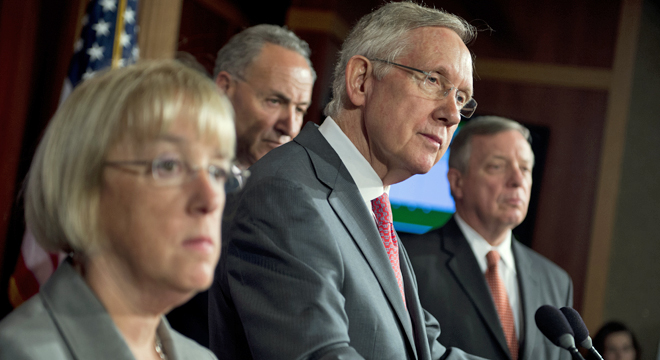Last summer, Democrats reached a low point as the debt limit debacle was wrapping up. Not only did they succumb to the GOP’s debt-reduction ransom in order to prevent an economic calamity, they failed to extract a penny in new tax revenues, and fissures were deepening between congressional leadership and the White House after President Obama offered to chop Medicare and Social Security. Republicans were firmly in control.
Fast-forward to today: Democrats are united in message and policy behind a narrative that holds Republicans accountable for the decline of the middle class, blaming them for rubber-stamping the agenda of a moneyed elite that is abusing the levers of power to rig the game in their favor. And Mitt Romney is their poster child for that phenomenon.
“It’s a perfect storm — the president’s making that narrative and then he’s running against a guy who exemplifies the top 1 percent, and who people don’t like,” said a Democratic leadership aide, who spoke to TPM on condition of anonymity to discuss internal matters. “So everything has sort of contributed to this overall backdrop. … It’s all of a piece.”
In recent weeks, Senate Democrats have united to pass a bill that ends the Bush-era tax cuts on incomes above $250,000. Along with that, they have — cohesively with the Obama campaign — used every tool at their disposal to pound Romney on his secretive tax returns and policy agenda, relentlessly painting him as a corporate predator who may not have even paid income taxes for a decade.
Democratic operatives chalk up their new posture to a number of factors: an altered political environment more focused on income inequality, message discipline instilled by Obama’s aides, a big victory on the payroll tax cut to start off the year and a growing fear of the policies a Republican victory on Election Day would mean.
“There’s nothing like an election to help focus peoples’ attention,” said Jim Manley, a strategist and former longtime senior aide to Senate Majority Leader Harry Reid (D-NV). “They suddenly realize what’s at stake.”
The most notable example of Democratic resolve came last month when Reid kept members in tough re-election battles — notably Sens. Claire McCaskill (D-MO) and Jon Tester (D-MT) — in line for the Bush tax cuts vote. Several red-state Democrats were uneasy about it, the leadership aide said, but were persuaded in part out of a desire to distinguish themselves with their Republican opponents on standing for the middle class.
“People like McCaskill and Tester — it definitely took them some whipping, but it was not like the health care vote — we didn’t have to offer a huge incentive to get people to do it,” the aide said. “McCaskill and Tester and the Nelsons are much more comfortable voting for tax policy that differentiates between the middle class and the wealthy now than they were even a year or two ago.”
“I think that says a lot, you know, that Democrats in tough races and tough states would rather be proactively taking steps to draw a contrast with Republicans on taxes,” the aide continued. “That’s a pretty big change — rather than just dodge it completely.”
The re-calibration began after the collapse of the 2011 debt ceiling talks between Obama and House Speaker John Boehner (R-OH), at which point the White House decided Republicans weren’t worth negotiating with. First came the Jobs Act and the message that government should provide relief to the middle class. Alongside that came the party’s resolve not to bend on budget matters unless Republicans drop their anti-tax absolutism, a stance vigorously enforced by Senate Democratic leadership since then.
“Ever since last September with the Jobs Act, communication with the White House has improved immensely and it’s been very successful,” the Democratic aide said. “The Obama campaign and White House are very good at keeping our members apprised of what they’re doing and why they’re doing it. And so our guys are given an extra level of confidence.”
The Obama campaign and Democrats are standing by Reid as he blazes on with his unproven claim that Romney didn’t pay taxes for a decade, mounting the pressure on the ex-governor to release his tax returns and prove him wrong.
Manley, who ran Reid’s messaging in 2009-2010 against a GOP united to thwart Obama’s agenda, added that Democrats have been able to exploit “fissures within the Republican caucus as they internally debate how hard of a line to take” ahead of the election.
As Democrats admit, luck played no small part in bringing them together.
“The biggest thing that changed was there was a major shift in the overall environment when it comes to the tax debate,” the Democratic aide said, crediting the Occupy Wall Street movement for helping make the wealth disparity a national issue. “People increasingly think the system is rigged to benefit those at the top.”






